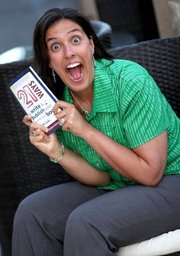Dealing with Negative Amazon Book Reviews
It’s another Expert Briefs, where I ask really smart business owners to answer your burning questions.
Last week, we talked about one of the most frustrating parts of publishing on Amazon – getting people to leave reviews of your book. You can read that discussion here if you missed it: Getting More Book Reviews on Amazon.
The other side of the coin is this.
You finally get some new reviews, when suddenly BAMMO! You get a 1 or 2 star review. After you cry a little and then grab a glass of wine, what do you do?
That's my question for the panel this week. I asked our panel of experts…
“For Amazon authors: How do you deal with the negative reviews that pop up every so often?”
I think you'll find their responses interesting. I did. 🙂
 Kelly McCausey of Solo Smarts Podcast says:
Kelly McCausey of Solo Smarts Podcast says:
On my Solopreneurs are Smarter book there are 16 reviews. 15 are there because I specifically asked for them. The 16th came out of the blue, and it was negative. He criticizes the book for not being something the book never promised to be (a how to guide).
I ignored the negative remark. Sure, I could point out that he apparently expected something not offered in the book's description – but what good would that have done?
 Connie Ragen Green of Affiliate Marketing Case Studies says:
Connie Ragen Green of Affiliate Marketing Case Studies says:
After speaking with my friend, Joe Vitale, last year about the negative reviews I was receiving for one of my books, I have followed his advice to leave it alone.
That particular books sells very well, so I think the negative reviews have actually made it controversial and more interesting. It's my book on affiliate marketing, so perhaps it is more open to criticism. At any rate, once I let go of worrying about what people were saying it began to sell and my productivity and self-esteem are intact.
 Kristen Eckstein of Self Publish on Demand says:
Kristen Eckstein of Self Publish on Demand says:
First of all, as an avid reader immersed in the self-publishing industry, some books just plain deserve bad reviews.
However, if you took the time to write and publish a high quality, professionally edited and formatted book, you have two choices: ignore or fight.
I had a bad review on one of our 21 Ways books that claimed the book was “full of typos,” yet couldn't give me a single example. His review was also laden with typos, which made me wonder if the guy knew what a typo was. At first I fought him, because this book, 21 Ways to Skyrocket Your Creativity by Tony Laidig was professionally edited by a developmental editor and went through four complete rounds of editing. Every published book has typos. It's impossible to catch them all. But multiple rounds of editing decreases that number, and I was honestly wanting to improve the book by fixing any typos he found. (By the way, if you click the link and buy that book, let me know if you see any typos and we'll get them fixed!) Eventually I chose to ignore the guy, especially when his last five-word reply had three typos in it.
If it's clearly an issue of formatting or typos or something else within your power to fix, fix it. Then reply to the reviewer and comment your thanks and that an update is available. For Kindle versions you can also notify Amazon to let all purchasers of the book know they can download an updated copy.
Most of the time you can just ignore bad reviews. Sometimes the review has nothing to do with your book in particular. Sometimes they're just having a bad day. However, for ones pointing out obvious issues with your books, take their advice and look into it. If you need to add more solid content, add it. If you need to fix some typos or weird formatting, fix it. If it's within your power to make your book – and your reputation – appear better to the world, do it. But don't let it ruin your day.
 Steve Scott of SSS: Internet Lifestyle without the B.S. says:
Steve Scott of SSS: Internet Lifestyle without the B.S. says:
In the past, I had the mindset to ignore bad reviews. However, in my last launch I had a 1* from a guy who said a specific technique didn't work. Instead of ignoring it, I politely responded and offered to help him figure it out. I even included my email address (using [at] & [dot] to not make the address click-able). He emailed me, and I spent an hour or so helping him out. After that, I politely asked if he'd consider changing the review since it was largely based on one technique. He agreed!!
From this experience, I now think two things:
1) Ignore some reviews. Haters are gonna hate. These are the people who say your books must have been written by chimpanzees. Or how the world must be warned to never buy any of your books because you're a horrible human being. You can't fix these types of reviews, so don't worry about them.
2) Take action on the “customer service” reviews. There will be times when someone doesn't know how to apply a specific technique, so they get mad and leave a negative review. Simply respond to them and offer to help them with the problem. Even if they don't respond, OTHER potential customers see you as someone who genuinely wants to help. (HINT: This is a good thing.)
Also, some reviews point out real flaws in your books. If that's the case, FIX this problem and then respond to the reviewer, showing that you listen to their criticism.
EXAMPLE:
If I could be brutally honest about myself, a couple of reviewers made the critique that my books had some grammatical mistakes. At first, I ignored these type of reviews. But after the third time, I decided to DO something about this problem. Since then, I've hired a professional proofreader to go over all my books. The cost? $50 to $150 per title. Not a bad price for an error-free (hopefully) reading experience.
My point is simple:
If a reviewer points out something negative, see if there is a way you can fix this problem. It shows that you listen to criticism and you’re focused on creating great products.
Note from Nik: I Highly Recommend this Kindle Book that Stever Wrote (It's only $2.99 at time of this post.)
 Nicole Dean of .. here! .. says:
Nicole Dean of .. here! .. says:
I think my friends have pretty much summed up my opinion on this.
1. From what I'm heard in Kindle author groups, typically, it's not good etiquette for the author to communicate with the reviewers. I find this odd, because I'd like to at least say “Hey thanks for reading and reviewing to those people.” Do you agree with this?
2. It is ok as the author to vote up or down reviews depending on whether they were helpful – or accurate. Please correct me if I'm wrong.
3. If you get a negative review and it's something you can address and fix, it is ok to respond to the reviewer (as Steve and Kristen mentioned above).
4. If you get a negative review and it's not something you can fix – it's best to let it go and ignore the person.
5. If you get a negative review, and fix an issue – like add a chapter to clear something up, then you can let Amazon know and they may send out a new revision to everyone who has your book. (It has to be substantial changes from what I understand, not like “I fixed a typo on page 101”.) This is a good thing.
6. When you get a bad review, one of the easiest ways to fix the situation is to go out and get some more good ones to hide the one bad one in a sea of awesomeness. Look back at last week's post on “How to Get More Amazon Reviews” for tips.
7. If you get a negative review that is confusing to you – then the likelihood is that the customer is confused. That MAY mean that your title, description, and sales copy isn't in alignment. Basically the customer thought they were buying one thing, when in fact, it's not even what your book is. I've seen many cases of negative reviews like that. In that case, clearing up the confusion is the only thing needed. (This oftentimes requires help from someone outside looking in.)
Talk to me.
What's your best tip for dealing with negative reviews? Got questions about specific instances? Ask us.
Warmly.
Nicole
PS. If you haven't yet, please let me know what your biggest issue with Kindle is – what is keeping you from success?
My Biggest Roadblock to Amazon Kindle Success is…
Please select a valid form


Leslie Truex
April 25, 2013 at 3:39 pmIt’s weird how you can have tons of great reviews, but it’s the one bad one that makes you second guess yourself…at least that’s how it is for me. I do read reviews because sometimes there is criticism that is helpful. But in the end, reviews are subjective. Some people like it, others don’t. I only respond to reviews of people I know and I do it privately. Otherwise I don’t respond to reviews good or bad.
Nicole
April 26, 2013 at 6:03 pmI think it’s like with anything. You can get 100 warm and fuzzies in a day, but that one cold prickly can put them all out of your mind.
Thank you for being part of my community and sharing your wisdom with us.
N
Susan Wowe
April 26, 2013 at 6:06 amI haven’t published any book on amazon yet, I agree with you that from time to time you can choose some reviews to reply to. But I think only choose good reviews to reply to is a better strategy. If there are some people who can’t appreciate your writing and want to vent out, let them be, answering bad reviews may make things worse in my opinion.
This is a great reading. Thanks.
Deb Gallardo
April 26, 2013 at 5:48 pmNicole,
I wanted to comment about the etiquette of not interacting with your reviewers. Two thoughts:
1 – Given that there was a huge hoo-hah about John Locke having paid for reviews of his fiction, (and which he neglected to include in his how-I-made-a-million-dollars-on-Kindle how-to book) it’s possible the writer’s groups fear cronyism? Although we all ask our friends and relatives to leave reviews, so I’m not sure that’s their beef.
2 – I posted a lengthy Amazon review of an On-Demand film I watched (and adored!) and the writer/director actually commented, saying it was her ‘all-time fave review’ that she’d gotten on ANY of her films. She said it was like I was inside her head, because I got all the subtle things she layered into the film to make it have real depth. And she said my review was doubly special to her because I’m a writer.
I’ve got to tell you, I would (almost) walk through fire for this woman now. So I think we need to gauge it case by case. If we’re in business, how can we NOT engage with our readers, if we engage with our biz audience? I’m wondering if these were fiction writers, non-fiction or a mix?
~Deb
Nicole
April 26, 2013 at 6:01 pmLove your response, Deb. Thank you. My gut says the same.
Perhaps I misunderstood?
I’ll ask around some more… 🙂
Appreciate you!
N
Fran
April 26, 2013 at 8:04 pmFascinating article.
I’ve heard it said in different variations, but essentially, a product/service experience will have your customers telling like 13 people on average, but a negative experience excites them to tell 30 or so.
That would make me concerned with the negative comments. In my amazon experience, I for some reason “assume” the reviews should be generally positive…so the negative ones really can influence me.
~Fran
Shawn Hessinger
April 28, 2013 at 12:48 amHi Nicole,
Bad reviews and criticisms are a part of life. There’s just no getting around it. And, I would add that some criticism can be very helpful. Like it or not, it’s true! In fact, being ignored is probably worse. So thank your lucky stars for your critics and look for what they can teach you.
Laura
April 28, 2013 at 12:03 pmThe first Amazon review I got on my free affiliate marketing FAQ book was mostly negative, and it really bothered me. The reviewer was disappointed that it wasn’t a step-by-step how-to of affiliate marketing, even though the description very clearly states that it consists of answers to questions like “what is affiliate marketing?” “How much does it cost to get started?” and “How much money can I make?” etc.
I SO wanted to fire off a snarky reply such as “Um, I’m not sure why you thought a free 19-page ebook would provide comprehensive affiliate marketing training…” but I resisted the impulse. However, I couldn’t resist the pull to answer in some way. So I did reply, and I tried very hard to make it nice and professional. I’d heard that it wasn’t a good idea to reply to bad reviewers, but in this case I just couldn’t make myself ignore it.
But I do appreciate the points your experts made, Nicole!
Teepu
April 30, 2013 at 5:29 amHonestly, from a customers point of view, I think a bad review would affect my perception of the book but if the review is bad then I don’t really pay much attention to it. I personally prefer books referred by friends but if I do buy a book which a friend of mine hasn’t read, I track down online the author and check out their other articles before I decide to buy one of their books. Authors need not to worry about bad reviews, they add credibility to the book but too much bad reviews, then you’ve got a problem in hand? Thanks for sharing in Bizsugar!
MSg Dale Day
April 30, 2013 at 7:43 amI angered some posters on a discussion forum who, in retaliation, went to my Kindle books and slammed them with bad reviews. THEY NEVER EVEN READ THEM!
So, I’ve reported them to Amazon. I’ve been told it’ll take a few weeks, but they WILL take a look to see if they’re legit.
Steve DiGioia
May 27, 2013 at 4:09 amI have been fortunate that I’ve received only very good reviews on my book so far (now I just went and jinxed it), but what can you do if you get a bad one? I can’t do anything about it. Just as you can’t please every customer that walks into your door, you can’t please every reviewer.
“Earn More Tips On Your Very Next Shift…Even If You’re a Bad Waiter”
…available at Amazon